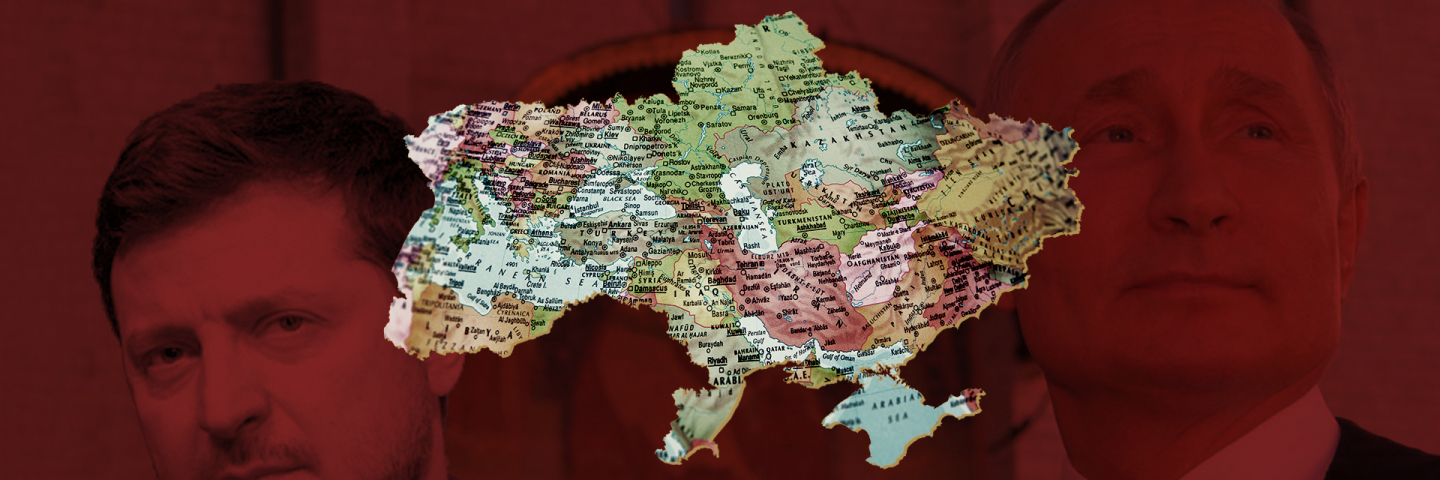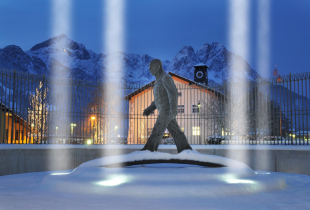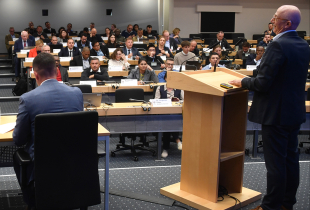
Ukraine and Emerging Trends in Russian and Turkish Foreign Policy
Introduction
This year our Strategic Competition Seminar Series (FY23 SCSS) activities focus on the theme of alternative Ukrainian future trajectories and the implications these may have for Russia and the West. SCSS#06 focuses on the three key trends in Turkey’s relationship with Russia in the context of Russia’s invasion of Ukraine, addressing defense and security cooperation in the Black Sea region, increases cooperation between the Erdoğan and Putin governments and the changing dynamics of interdependence. It then addresses three emerging trends in Russian foreign policy – radicalization of ideology, isolation from West and reach-out to Global South and interaction via the grey zone – before concluding.
Trends in Turkish Foreign Policy
First, we can explore the Turkey/Ukraine axis in defense cooperation. Turkey’s trade and tourism relations with Ukraine were dominant before 2014 but after Russia’s illegal annexation of Crimea the diplomatic and security partnership came to the fore. Turkey supports Ukraine politically by not recognizing Russia’s annexation of Crimea and so upholding Ukraine’s statehood (territorial integrity and sovereignty). In military terms, Turkish production of corvettes for Ukraine’s navy, the sale of Bayraktar TB2 combat drones and plans for their joint production, and the closing the Bosphorus and Dardanelles straits to Russian warships thereby preventing escalation in the Black Sea, all help Ukraine to assert its statehood. Turkey has been instrumental in sponsoring POW swaps and the grain deal. At the same time, by supporting Ukraine, Turkey is in fact strengthening its own position in the region, as Ukraine helps to deter Russian expansion, which is a threat to Turkey itself.
This cooperation can form the backbone of post-war Black Sea security. In effect, as the war progresses, the Ukrainization of Turkish foreign policy drives its Westernization. However, Russia is not a Turkish partner, let alone ally. Russia is a state with which Turkey can engage through situational cooperation that is rooted in mutual distrust of the West: Turkey is not so much pro-Russian as anti-Western. Turkey also benefits economically with Russia from commercial trade. Do costs of balancing support for Ukraine and the West outweigh benefits of situational commercial deals?
Second, we can note increased cooperation between governments in Moscow and Ankara ahead of the critical 2023 election in Turkey. These elections occur in the context of the earthquake and humanitarian disaster, as well as economic and political insecurity. Russian financial support and investments in Turkey, in both infrastructure and critical sectors, can directly benefit the Erdoğan government. This nexus helps explain not only Turkey’s refusal to engage in sanctioning Russia, but also its circumvention of western sanctions through engagement with Russian oligarchs and the reported sale to Russia of dual-use technologies.
Rosatom’s construction of the Akkuyu Nuclear Power Plant is a case in point. Russia will build, own and operate, regulate (“regulatory capture”), and decommission the Akkuyu NPP, which has a service life of 60-80 years. Rosatom will also supply the fuel and manage the waste generated, while helping Turkey build the necessary human capital (i.e. Turkish students in nuclear engineering to be trained in Russia). The Mersin-Akkuyu site of the NPP is located on the eastern Mediterranean coast close to Incirlik and Tartus. Russia appears to assert the right to construct commercial ports and terminals for maritime transport, storage, and loading and offloading NPP waste. In effect, it constructs a forward base to meet the logistical needs of Russian naval ships in the Mediterranean. This base may establish a search radar and an S-400 high-altitude air defense system in the Akkuyu region. These factors suggest that Turkey will become heavily dependent on Rosatom technology and energy can be used as a means of coercion. The role of Rosatom and model of civil nuclear reactor construction is relevant for wider Russian NPP diplomacy to Indonesia, Egypt, and Hungary.
Third, changes within the dynamics of interdependence in both countries are also in evidence. As Russia becomes further embroiled in its war with Ukraine, Turkey can displace Russia in South Caucasus and challenge Russia in Central Asia. Russia’s military underperformance in Ukraine helps dispel myths prevalent in Turkey of Russia as a “great power.” At the same time, Russia, as Turkey’s strategic rival can destabilize Syria, and remains a major source of Turkey’s energy imports, economic benefits, and financial resources. Turkey does not confront Russian state-affiliated media propaganda targeting Turkish public opinion. Russian state-sponsored Sputnik News Agency and RS FM (Voice of Russia–Sputnik FM) operate freely in Turkey. Pro-Russian narratives can also promote President Erdoğan’s coalition with the Eurasianists and undermine Turkey’s cooperative ties with West, blaming the West/NATO/US for instigating the war in Ukraine and causing regional instability. These narratives also steer Turkey toward Russia, Iran, and alliances with non-Western countries, like BRICS, under the cloak of promoting a fair and inclusive world order.
Russia and Turkey are likely to remain “frenemies,” strategic rivals linked by post-imperial identities, a willingness to project power outside their borders, authoritarian trends, and benefits of economic cooperation. To counter Russian influence in Turkey is difficult. The starting point is recognizing the need to manage a pragmatic, assertive, and transactional Turkey that seeks to maximize benefits and minimize costs in relations with all of its partners. Therefore, to keep Turkey engaged with the West, anchored as it is in NATO, it’s important to increase the costs of Turkish support for Russia, on the one hand, and to make clear the benefits of being strategically orientated westwards, on the other. Confidence building measures to address the lack of trust to the West, including through earthquake diplomacy, Western investments based on conditionality, joint initiatives around alternative energy sources (the “Middle Corridor” initiative), and support for Ukraine-Turkey cooperation in a post-war context and in maritime security are crucial to this end. Russian propaganda can be countered through greater emphasis on Turkish language outlets providing counter-narratives. The greater EU and NATO cooperation with Turkey, the less the interdependencies between Ankara and Moscow.
Trends in Russian Foreign Policy
Three key trends mark Russia’s wartime foreign policy. The first trend is a radicalization of Russia’s ideological beliefs. Russia is now more ideological, promoting a toxic mix of radical geopolitics, anti-Westernism/anti-colonialism and ultra-conservative “traditional values” (gender roles and religion). Its geopolitics are now more openly imperial (seeking as it does the restoration of “historical Russia”) and more radically revisionist, promoting a full-on assault of the liberal international order. Russia, in effect, through maximalist rhetoric, seeks to “make the international system safe for emerging empires.” Putin uses ideology as a tool of reflexive control, setting Russia on a future path that his successors cannot easily or quickly reverse. Such is the vehemence of Russian anti-Westernism, that is difficult not to conclude that Russian policy-makers appear to deliberately box themselves in, placing themselves in an “iron cage.” Russian ideological beliefs can be understood as a façade for power politics, but it rests on core ideas that are genuinely held by this current elite in Russia, even if much is instrumentalized. Russia is still pragmatic when necessary. It balances support for Iran with not totally alienating Israel. Azeri-Turkey and Turkish-Israeli military cooperation is balanced by a Russia-Armenia-Iran nexus. Revisionist Russia offers a vision of how states can break with the current international order and survive if not yet wholly thrive. The litmus test of survivability for Russia is steadily increasing the number of sanction avoiding states.
The second big trend is Russia’s diplomatic outreach to the Global South. Despite the remarkable unity shown in the UN General Assembly votes, Russia has managed to maintain a bloc of about 50 countries which are willing to abstain on votes against Russia or be conveniently absent. These countries include big democracies such as India and South Africa. A wider group of states is happy to vote with the majority in the UN on the principle of invasion or annexation - but prefers not to actively work against Russia – that left just 93 states willing to vote Russia off the Human Rights Council. This group includes, for example, the Gulf States and some Latin American countries. And there are even fewer willing to impose sanctions.
Why is Russia having this traction? A number of explanations can be advanced. Some countries have long memories of Russia as an anti-colonial power in the Soviet period. Russian propaganda is more effective in parts of the Middle East and Africa than in Europe. There is already a strong dose of anti-Westernism in many countries in Asia, Latin America, and Africa – few major non-Western powers wish to see a re-invigorated collective West that may impinge on their national interests in the future. Above all, it’s a sense that Ukraine is a European and not a global issue, and that for most countries there are more pressing local and regional concerns - food security, economic instability, and their own conflicts, which have often been overlooked.
We can see these attitudes emerging in opinion polls. Attitudes towards Russia have polarized across the world. While 87% of people living in the West hold a negative view of Russia, in other regions some 66% view Russia positively. The war has hit Russia’s standing overall, but it has remained largely stable in countries like Egypt and Indonesia or declined only slightly, as in India and Vietnam.
In terms of Global South outreach, we can distinguish three zones crucial for Russian foreign policy. First, Eurasia and China, is a huge borderland for sanctions-busting. A March, 2023 joint statement from the US Departments of Justice, Commerce, and the Treasury noted that countries such as China, Armenia, Turkey, and Uzbekistan can be used as “transit points” for the illegal transfer of prohibited goods to Russia or Belarus. In the first nine months of the war in Ukraine, the volume of goods supplied from the European Union to Russia decreased by 47%. In the same period, the supply of European products to Russia’s neighbouring countries, such as Georgia, Kazakhstan, and Kyrgyzstan, increased by 48%. Second, the Gulf States serve as a vital deal making, logistics, finance, and business hub for Russia. Third, Africa is a new zone of competition with the West.
A third notable trend is Russian foreign policy increasingly operating in the grey zone. Russia has a network of informal and illicit networks that are the main levers of Russian influence. Illicit finance and organized crime will be vital for the Russian state to survive the threat of sanctions and political and information warfare will offer continued opportunities to challenge the West. Wagner Private Military Corporation (PMC) demonstrates the mixing of arms, mercenaries, ideological and information campaigns, and niche economic opportunities. Wagner operates in small countries, where they can effectively capture part of the state apparatus. Wagner’s networks are self-financing and have become adept at creating financial and trade networks that bypass sanctions and regulatory regimes. Russia becomes deeply embedded in Central African Republic and can then use CAR as a platform and develop routes out through Cameroon and Sudan, so establishing a wider illicit network.
The war in Ukraine provides the opportunity for Russia’s ideological oligarchs - second-tier figures who use their aggressive patriotism to lever business deals, at home and abroad – to become players in Russian foreign policy. The flood of Russian money into occupied territories of Ukraine is already proving a lucrative source of rents for Russia’s military, Chechen warlords, and well-connected construction companies. In effect, the criminalization of the Russian elite is sanctified in the name of patriotism, sovereign internationalism, and strategic autonomy. Russia believes great powers break the rules, indeed that rule-breaking is the hall-mark of a great power. Such beliefs are reinforced by bad governance norms in Russia where ‘rule by law’ rather than ‘rule of law’ and the blurring of internal-external, war-peace, and regime-state are central pillars of Putinism.
Conclusions
Turkey is emblematic of third-party states with direct interests at stake in the outcome of Russia’s invasion of Ukraine and whose strategic response is pragmatic realpolitik balancing. But the longer the war continues the harder such balancing becomes. China’s so-called “12 Point Peace Plan” aims to bolster its own reputation in the Global South as a peacemaker, rebut accusations of silent complicity, and potentially create justification for increasing support for Russia. China supports Ukraine’s statehood but blames NATO “expansion” for the war and condemns Western sanctions while largely observing them. China seeks to avoid its nightmare scenario – Russian defeat leading to regime change in Russia and a pro-Western government - but realizes that unconditional support to Russia would damage China’s economic and technological advancement. Unconditional support would force a break with the West – a point Western “red lines” messaging effectively conveys. In reality, a weaker, more isolated China-dependent Russia allows China, through calibrated oil and gas purchases and potentially facilitating the supply of weapons, to attempt escalation control over the war.
Russia’s Turkey policy challenges the coherence and cohesion of Russia’s foreign policy amidst chaos, reactive thinking, and intra-elite struggles exacerbated by the pressure of fighting a three-day war now in its second year. Russia undertakes pragmatic practice in the grey zone but cloaks such behavior on the ground in a radical take-no-prisoners black-and-white world view asserting simplistic ideological problem-blame-solution bromides. Russia is clearer about what it is against than offering a vision of what it is for. Many countries in the Global South do not want to make a choice - but few show overt support for Moscow. While illicit finance and organized crime are major challenges in effective sanctions enforcement, some key instruments do work in improving transparency, enforcing regulations, and making it increasingly difficult for jurisdictions to cover up for Russian illicit behavior. The desire of many Russian businesspeople to continue to engage with the global economy may yet prove to be the key driver for change in Russia.
Ukraine itself represents a largely untapped counter-narrative in that it is pro-Western (identity, values, and orientation) but not part of the institutionalized West (EU and NATO). Thus, Ukraine’s role in countering Russian anti-colonial rhetoric in Turkey, Africa, and throughout the Global South. Ukraine stands testament to argue that Russia is not the Soviet Union, which did fund training and education, but an imperial colonial power on a war of conquest, prepared to weaponize interdependencies and hold the Global South hostage to gain leverage over Kyiv. Indeed, Ukraine launches an African diplomatic effort to open ten embassies in key African states and exert untapped Ukrainian soft-power, being able to directly challenge Russian narratives about the war.
March 8, 2023
About the Authors
Dr. Yevgeniya Gaber a Ukrainian foreign policy expert and a Non-Resident Senior Fellow at the Center in Modern Turkish Studies, Norman Paterson School of International Affairs, Carleton University in Ottawa, Canada. Previously, she worked as a Foreign Policy Advisor to the Prime Minister of Ukraine (2021), Deputy Director of the Diplomatic Academy at the Ministry of Foreign Affairs of Ukraine (2018-2020), and political officer in the Embassy of Ukraine in Ankara (2014-2018). Her research interests cover European and Black Sea regional security, with a focus on security and foreign policies of Ukraine, Russia, and Turkey. Dr. Gaber is widely published, and has given presentations and lectures on the related topics for the Estonian School of Diplomacy, Geneva Centre for Security Policy, George C. Marshall European Center for Security Studies, NATO Professional Development Program, and leading universities in Europe, Canada, and the United States.
Dr. David Lewis is a Professor of International Relations at the University of Exeter. His research interests include international peace and conflict studies, with a regional focus on Russia and other post-Soviet states. Dr. Lewis is the author of numerous articles and books on Russia and Eurasia, including most recently Russia’s New Authoritarianism: Putin and the Politics of Order (Edinburgh University Press, 2020).
Dr. Graeme P. Herd is a Professor of Transnational Security Studies in the Research and Policy Analysis Department at the George C. Marshall European Center for Security Studies. His latest books include Understanding Russia’s Strategic Behavior: Imperial Strategic Culture and Putin’s Operational Code (London and New York, Routledge, 2022) and Russia’s Global Reach: A Security and Statecraft Assessment, ed. Graeme P. Herd (Garmisch-Partenkirchen: George C. Marshall European Center for Security Studies, 2021).
The George C. Marshall European Center for Security Studies
The George C. Marshall European Center for Security Studies in Garmisch-Partenkirchen, Germany is a German-American partnership and trusted global network promoting common values and advancing collaborative geostrategic solutions. The Marshall Center’s mission to educate, engage, and empower security partners to collectively affect regional, transnational, and global challenges is achieved through programs designed to promote peaceful, whole of government approaches to address today’s most pressing security challenges. Since its creation in 1992, the Marshall Center’s alumni network has grown to include over 15,000 professionals from 157 countries. More information on the Marshall Center can be found online at www.marshallcenter.org.
The Clock Tower Security Series provides short summaries of Seminar Series hosted by the George C. Marshall European Center for Security Studies. These summaries capture key analytical points from the events and serve as a useful tool for policy makers, practitioners, and academics.
The articles in the The Clock Tower Security Series reflect the views of the authors (Yevgeniya Gaber, David Lewis, and Graeme P. Herd) and are not necessarily the official policy of NATO, the United States, Germany, or any other governments.

